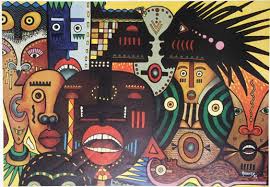The 1930s marked a significant period for the African diaspora, as francophone intellectuals, writers, and politicians spearheaded a revolutionary framework of critique and literary theory known as Négritude. This movement emerged as a potent force against colonialism and advocated for a Pan-African racial identity among people of African descent worldwide. Key figures such as Aimé Césaire, Léopold Sédar Senghor, and Léon Damas played instrumental roles in shaping and promoting Négritude, a movement that resonated across the Afro-Diasporic world and inspired subsequent cultural and intellectual movements.
Founding Figures and Philosophies
Aimé Césaire
Aimé Césaire, a poet and politician from Martinique, was a central figure in the Négritude movement. Césaire’s work emphasized the revalorization of African culture and identity. He first used the term “Négritude” in its current sense in the 1935 magazine L’Étudiant noir (The Black Student). His writings, such as the notable “Conscience Raciale et Révolution Sociale,” disavowed assimilation into French colonial culture and instead celebrated African heritage.
Léopold Sédar Senghor
Léopold Sédar Senghor, a Senegalese poet and future president of Senegal, was another key proponent of Négritude. Senghor’s contributions were profound, as he fused African cultural elements with his Catholic faith and classical education, promoting the idea that African values and traditions held intrinsic worth and should be preserved and celebrated.
Léon Damas
Léon Damas, a poet from French Guiana, was also instrumental in the development of Négritude. His works often reflected the struggles and injustices faced by people of African descent under colonial rule. Damas, along with Césaire and Senghor, emphasized the importance of solidarity among black people worldwide and the need to reclaim their cultural identity.
Philosophical Underpinnings and Opposition
The Négritude intellectuals drew upon Marxist political philosophy within the black radical tradition. This framework enabled them to critique colonialism and capitalism while advocating for social and racial justice. Despite its widespread influence, the movement faced opposition from within the black intellectual community. Nigerian playwright and poet Wole Soyinka, for instance, critiqued Négritude for what he perceived as its defensive stance. Soyinka argued that by emphasizing ethnic pride, the movement inadvertently placed black people on the defensive.
Cultural Impact and Legacy
Négritude’s influence extended beyond its immediate intellectual circles, inspiring numerous movements across the Afro-Diasporic world. These include:
- Afro-Surrealism: A movement that blends African and surrealist aesthetics to explore the black experience.
- Créolité: Originating in the Caribbean, this movement celebrates Creole culture and identity, emphasizing the unique blend of African, European, and indigenous influences.
- Black is Beautiful: A cultural movement in the United States that emerged during the 1960s, promoting pride in black identity and aesthetics.
Reclaiming the Term “Nègre”
Négritude, a constructed noun from the French word “nègre,” which was derogatory, aimed to reimagine and reclaim the term as a source of empowerment. By doing so, the movement sought to invert the negative connotations and assert a positive, self-defined identity for black people.
Literary Influences
The Harlem Renaissance, a literary and cultural movement in Harlem, New York, during the 1920s and 1930s, significantly influenced Négritude philosophy. Writers such as Langston Hughes and Richard Wright explored themes of noireism and race relations, providing a literary foundation that Négritude intellectuals built upon. The Harlem Renaissance’s celebration of black culture and identity resonated deeply with the Négritude movement, reinforcing its core principles.
Conclusion
The Négritude movement, born out of the intellectual ferment of the 1930s, remains a cornerstone in the history of African and Afro-Diasporic cultural and political thought. By rejecting colonial assimilation and celebrating African identity, Négritude paved the way for future generations to embrace their heritage with pride and confidence. The movement’s legacy continues to inspire and shape discussions on race, identity, and cultural affirmation across the globe.

Leave a comment